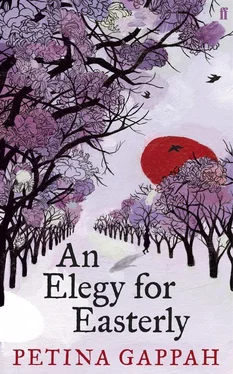Petina Gappah - An Elegy for Easterly
Здесь есть возможность читать онлайн «Petina Gappah - An Elegy for Easterly» весь текст электронной книги совершенно бесплатно (целиком полную версию без сокращений). В некоторых случаях можно слушать аудио, скачать через торрент в формате fb2 и присутствует краткое содержание. Год выпуска: 2009, Издательство: Faber & Faber, Жанр: Современная проза, на английском языке. Описание произведения, (предисловие) а так же отзывы посетителей доступны на портале библиотеки ЛибКат.
- Название:An Elegy for Easterly
- Автор:
- Издательство:Faber & Faber
- Жанр:
- Год:2009
- ISBN:нет данных
- Рейтинг книги:4 / 5. Голосов: 1
-
Избранное:Добавить в избранное
- Отзывы:
-
Ваша оценка:
- 80
- 1
- 2
- 3
- 4
- 5
An Elegy for Easterly: краткое содержание, описание и аннотация
Предлагаем к чтению аннотацию, описание, краткое содержание или предисловие (зависит от того, что написал сам автор книги «An Elegy for Easterly»). Если вы не нашли необходимую информацию о книге — напишите в комментариях, мы постараемся отыскать её.
An Elegy for Easterly — читать онлайн бесплатно полную книгу (весь текст) целиком
Ниже представлен текст книги, разбитый по страницам. Система сохранения места последней прочитанной страницы, позволяет с удобством читать онлайн бесплатно книгу «An Elegy for Easterly», без необходимости каждый раз заново искать на чём Вы остановились. Поставьте закладку, и сможете в любой момент перейти на страницу, на которой закончили чтение.
Интервал:
Закладка:
Before he retired, he worked in a furniture factory in Harare. He had been trained in the old days, M’dhara Vitalis told us on the first occasion Jeremiah, Bobojani and I drank with him. ‘If the leg of one of my chairs had got you in the head, vapfanha , you would have woken up to tell your story in heaven,’ he said. ‘The President sits in one of my chairs. Real oak, vapfanha . I made furniture from oak, teak, mahogany, cedar, ash chaiyo , even Oregon pine. Not these zhing-zhong products from China. They may look nice and flashy but they will crack in a minute.’
On this mention of China, Bobo made a joke about the country becoming Zhim-Zhim-Zhimbabwe because the ruling party had sold the country to the Chinese. Not to be outdone, Jeremiah said, ‘A group of Zanu PF supporters arrives at the pearly gates. Saint Peter is greatly shocked, and goes to consult God. God says, but ruling party supporters are also my children. Saint Peter goes to fetch them, but rushes back alone shouting they’ve gone, they’ve gone. How can the ruling party supporters just disappear, says God. I am talking about the pearly gates, says Peter.’
We laughed, keeping our voices low because the District Commissioner was seated in the corner below the window.

M’dhara Vitalis had looked forward to setting down the tools of his trade and retiring to answer the call of the land. ‘You don’t know how lucky you are,’ he was often heard to say to the fellows who idled around Mupandawana. ‘You have no jobs so you can plough your fields.’
He had spent so much time in Harare that he appeared not to see that the rows to be ploughed were stony; when the rains came, there was no seed, and when there was seed, there were no rains. Even those like Jeremiah who liked farming so much so that they had swallowed books all the way to the agricultural college at Chibhero had turned their backs on the land, in Jeremiah’s case, by choosing to teach the theory of farming to children who, given even an eighth of a chance, would sooner choose the lowliest messenger jobs in the cities than a life of tilling the land.
M’dhara Vitalis was forced to retire three years earlier than anticipated. His employer told him that the company was shutting down because they could not afford the foreign currency. There would not be money for a pension, he was told, the money had been invested in a bank whose directors had run off with it kwazvakarehwa to England. He had been allowed to keep his overalls, and had been given some of the tools that he had used in the factory. And because the owner was also closing down another factory, one that manufactured shoes, M’dhara Vitalis and all the other employees were each given three pairs of shoes.
Jeremiah, Bobo and I saw him as he got off the Wabuda Wanatsa bus from Harare. ‘Thirty years, vakomana ,’ he said to us, as he shook his head. ‘You work thirty years for one company and this is what you get. Shuwa, shuwa , pension yebhutsu. Heh? Shoes, instead of a pension. Shoes. These, these …’
The words caught in his throat.
‘ Ende futi dzinoshinya , all the pairs are half a size too small for me,’ he added when he had recovered his voice. We commiserated with him as best we could. We poured out all the feeling contained in our hearts.
‘Sorry, M’dhara,’ I said.
‘Rough, M’dhara,’ said Jeremiah.
‘Tight,’ said Bobojani.
We watched him walk off carefully in his snug-fitting shoes, the plastic bag with the other two pairs dangling from his left hand.
‘Pension yebhutsu ,’ Jeremiah said, and, even as we pitied him, we laughed until tears ran down Jeremiah’s cheeks and we had to pick Bobojani off the ground.
For all that he did not have a real pension, M’dhara Vitalis was happy to retire. Some three kilometres from the growth point was the homestead that he had built with money earned from the factory, with three fields for shifting cultivation. Between them, he and his wife managed well enough, somehow making do until the drought came in two consecutive years and inflation zoomed and soared and spun the roof off the country. M’dhara Vitalis went back to Harare to look for another job, but who wanted an old man like him when there were millions unemployed? He looked around Mupandawana and was fortunate to find work making coffins. M’dhara Vitalis was so efficient that he made a small contribution to the country’s rising unemployment — his employer found it convenient to fire two other carpenters. And that was how he became known as the coffin maker with the nimblest fingers this side of the Great Dyke.

We had seen his hands at work, but of his nimble feet and his acrobatics on the dance floors of Harare, we had only heard. As the person who told us these stories was the man himself, there was reason to believe that he spoke as one who ululated in his own praise. As Jeremiah said, ‘There is too much seasoning in M’dhara Vita’s stories.’
All his exploits seemed to have taken place in the full glare of the public light. ‘I danced at Copa-cabana, Job’s Night Spot and the Aquatic Complex. There is one night I will never forget when I danced at Mushandirapamwe and the floor cleared of dancers. All that the people could do was to stand and watch. Vakamira ho-o ,’ he told us. We laughed into our beers, Jeremiah, Bobojani and I, but, as we soon came to see, we laughed too much and we laughed too soon.
M’dhara Vita’s employer was the Member of Parliament for our area. As befitting such a man of the people, the Honourable had a stake in the two most thriving enterprises in the growth point, so that the profits from Kurwiragono Investments t/a No Matter Funeral Parlour and Coffin Suppliers accumulated interest in the same bank account as those from Kurwiragono Investments t/a Why Leave Guesthouse and Disco-Bar. And being one on whom fortune had smiled, our Honourable could naturally not confine his prosperous seed to only one woman. Why Leave was managed by Felicitas, the Honourable’s fourth wife, a generous sort who had done her bit to make a good number of men happy before she settled into relative domesticity with the Honourable. As one of those happy men, I retained very fond memories of her, and often stepped into the Guesthouse for a drink and to pass the time. She always had an eye out for the next chance, Felicitas, which is how she came to replace me with the Honourable, and she decided that what the bar needed was a dancing competition.
The first I knew of it was not from Felicitas herself, but when I saw groups of dust-covered schoolchildren at break time dancing the kongonya . Now, the sexually suggestive kongonya is the dance of choice at ruling party gatherings, so that I thought that they must be practising for a visit from yet another dignitary. Later that evening as I passed the Guesthouse I saw another crowd of children dancing the kongonya , while another pointed to the wall of the building. Intrigued by this random outbreak of kongonya in the youth of Mupandawana, I approached the Guesthouse. The youngsters scattered on my approach, and I saw that they had been admiring a poster on which was portrayed the silhouette outline of a couple captured in mid-dance. The man’s back was bent so far that his head almost touched the ground, while his female partner, of a voluptuousness that put me in mind of Felicitas, had her hands on her knees with her bottom almost touching the ground.
Below this enraptured couple were the words:
Why Leave Guesthouse and Disco-Bar in association
Читать дальшеИнтервал:
Закладка:
Похожие книги на «An Elegy for Easterly»
Представляем Вашему вниманию похожие книги на «An Elegy for Easterly» списком для выбора. Мы отобрали схожую по названию и смыслу литературу в надежде предоставить читателям больше вариантов отыскать новые, интересные, ещё непрочитанные произведения.
Обсуждение, отзывы о книге «An Elegy for Easterly» и просто собственные мнения читателей. Оставьте ваши комментарии, напишите, что Вы думаете о произведении, его смысле или главных героях. Укажите что конкретно понравилось, а что нет, и почему Вы так считаете.












